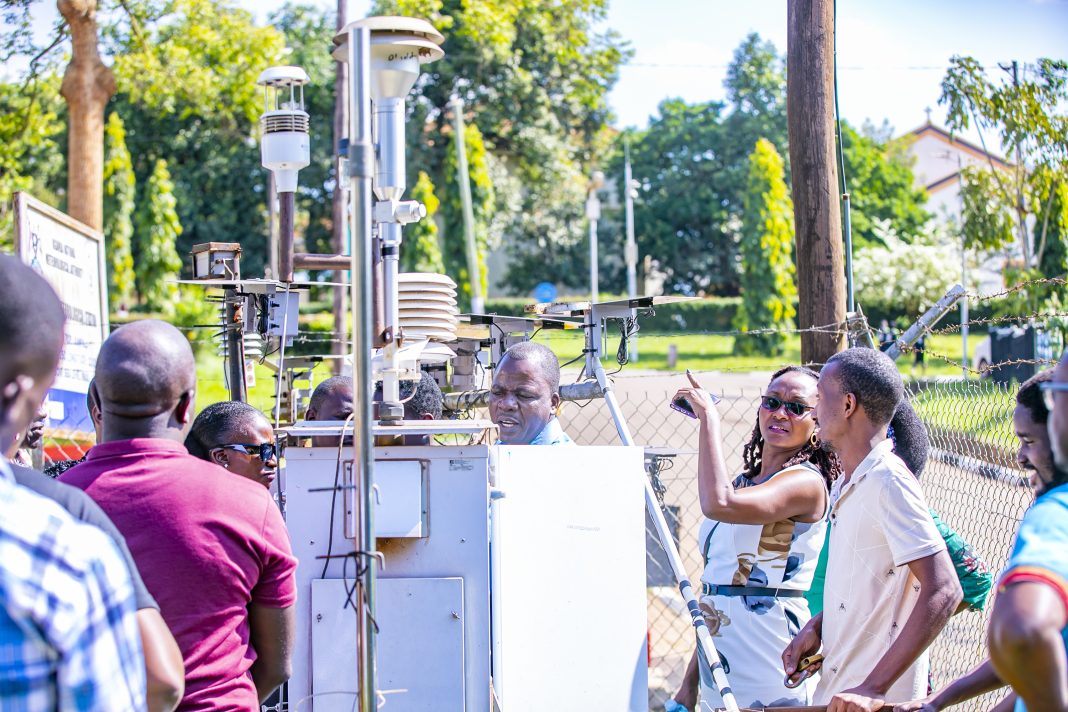Taking personal responsibility in combating air pollution is becoming a rallying call in Kampala. Recently, the Kampala Capital City Authority (KCCA) organized a two-day workshop for its staff on air quality management.
The workshop examined the severe effects of both short- and long-term exposure to air pollution, associating it with various diseases such as stroke, chronic obstructive pulmonary disease, and multiple cancers.
Evidence from the World Health Organization (WHO) indicates that exposure to air pollution is also linked to conditions like type 2 diabetes, obesity, Alzheimer’s disease, and dementia.
To address this challenge directly, the training included visits to Kampala’s air quality monitoring sites, providing participants with a firsthand look at the city’s pollution sources and ongoing mitigation efforts.
A notable visit was to Makerere University, home to the AirQo project, which is leading air quality improvements across Uganda and Africa.
Here, participants were introduced to the advanced technologies and methodologies used in monitoring air quality, as well as the alarming statistics highlighting Kampala’s pollution levels.
Professor Engineer Bainomugisha, heading the AirQo Project, emphasized the importance of individual responsibility in ensuring clean air.
Starting from their own homes, individuals were encouraged to adopt green mobility, use green energy, plant trees, and take other actions that improve air quality.
Angela Nshimye reinforced this during her presentation, highlighting the essential elements of an effective air quality management program: continuous monitoring, identifying pollution sources, and implementing targeted interventions.
According to an AirQo study, Kampala’s primary air pollution sources include residential combustion, transportation, dust, industry, and waste burning.
These findings highlight the need for comprehensive strategies addressing each pollution source. Kampala’s average air pollution level of 37 micrograms per cubic meter surpasses recommended standards, further emphasizing the urgency for action.
In response, Uganda has introduced national air quality regulations and a city air quality action plan. These initiatives focus on reducing pollution through measures such as waste reduction, increasing green spaces, minimizing dust through road paving, and promoting sustainable mobility options.
Dr. Richard Walyomu from the KCCA Directorate of Public Health and Environment praised the participants’ active involvement and stressed the importance of public awareness in combating air pollution.
Dr. Alex Ndyabakira echoed the urgency of the situation, emphasizing that climate change is worsening global air quality challenges.
The collaborative efforts of projects like AirQo and the insights gained from monitoring sites are crucial in Kampala’s ongoing battle against air pollution.
Personal Responsibility in Fighting Air Pollution Gains Momentum in Kampala
Taking personal responsibility in combating air pollution is becoming a rallying call in Kampala. Recently, the Kampala Capital City Authority (KCCA) organized a two-day workshop for its staff on air quality management.
The workshop examined the severe effects of both short- and long-term exposure to air pollution, associating it with various diseases such as stroke, chronic obstructive pulmonary disease, and multiple cancers.
Evidence from the World Health Organization (WHO) indicates that exposure to air pollution is also linked to conditions like type 2 diabetes, obesity, Alzheimer’s disease, and dementia.
To address this challenge directly, the training included visits to Kampala’s air quality monitoring sites, providing participants with a firsthand look at the city’s pollution sources and ongoing mitigation efforts.
A notable visit was to Makerere University, home to the AirQo project, which is leading air quality improvements across Uganda and Africa.
Here, participants were introduced to the advanced technologies and methodologies used in monitoring air quality, as well as the alarming statistics highlighting Kampala’s pollution levels.
Professor Engineer Bainomugisha, heading the AirQo Project, emphasized the importance of individual responsibility in ensuring clean air.
Starting from their own homes, individuals were encouraged to adopt green mobility, use green energy, plant trees, and take other actions that improve air quality.
Angela Nshimye reinforced this during her presentation, highlighting the essential elements of an effective air quality management program: continuous monitoring, identifying pollution sources, and implementing targeted interventions.
According to an AirQo study, Kampala’s primary air pollution sources include residential combustion, transportation, dust, industry, and waste burning.
These findings highlight the need for comprehensive strategies addressing each pollution source. Kampala’s average air pollution level of 37 micrograms per cubic meter surpasses recommended standards, further emphasizing the urgency for action.
In response, Uganda has introduced national air quality regulations and a city air quality action plan. These initiatives focus on reducing pollution through measures such as waste reduction, increasing green spaces, minimizing dust through road paving, and promoting sustainable mobility options.
Dr. Richard Walyomu from the KCCA Directorate of Public Health and Environment praised the participants’ active involvement and stressed the importance of public awareness in combating air pollution.
Dr. Alex Ndyabakira echoed the urgency of the situation, emphasizing that climate change is worsening global air quality challenges.
The collaborative efforts of projects like AirQo and the insights gained from monitoring sites are crucial in Kampala’s ongoing battle against air pollution.























